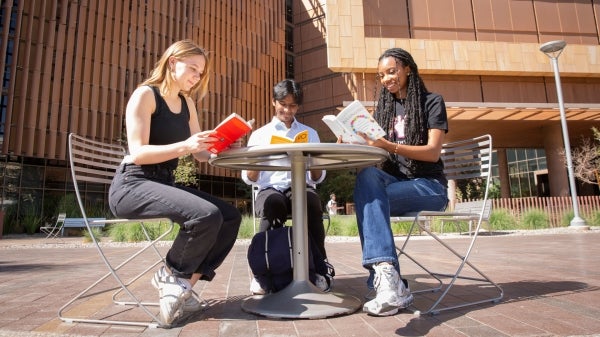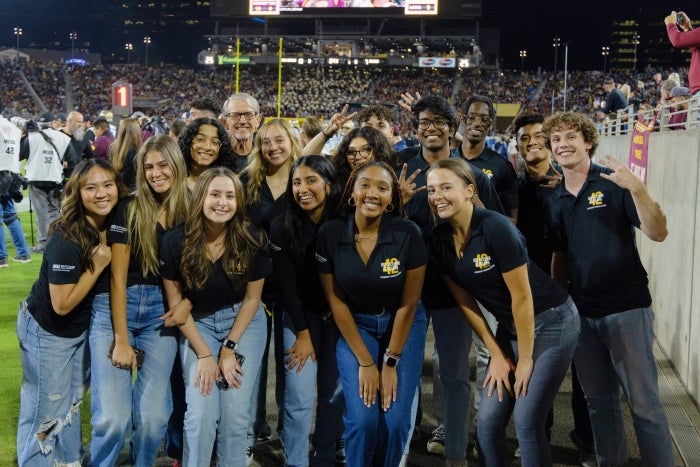Outstanding sustainability grad will bring startup experience into new career

After graduation, Grace Reiter is moving to Michigan for her new job as a financial analyst with Lineage, the largest dynamic temperature-controlled warehousing and logistics company in the country. The company’s focus on reimagining the global food supply chain and fighting food insecurity appealed to Reiter, whose work on the Verdantt Fresh startup over the last couple of years has sought to address these exact challenges.
Editor’s note: This story is part of a series of profiles of notable spring 2025 graduates.
Grace Reiter, a student with a vast array of interests and energy to match, took advantage of every relevant opportunity that came her way during her four years at Arizona State University.
She served on the undergraduate student government, held an internship with the Julie Ann Wrigley Global Futures Laboratory’s WE Empower program, won the honor of being ASU’s 2023 Homecoming Queen, conducted research on a variety of sustainability and technology initiatives including solar energy and educational technology, participated in a study abroad experience in France and co-founded a startup through the Luminosity Lab geared towards addressing food insecurity — all while tackling a full course load as a student in both the College of Global Futures and Barrett, The Honors College.
Originally from a small town in Ohio, Reiter was able to build a strong community in a new state by trying different things at the university.
“I am proud of myself for being resilient. My college experience has been marked by significant ups and downs, and I often felt homesick,” she said. “At first, making friends and finding a way to make Arizona feel like home were really challenging.
“However, I consistently worked to put myself out there, and now I am leaving with an amazing support network established in the Southwest, full of people I used to call strangers. I can’t put into words how honored I am to have come to ASU with so much uncertainty, and to be leaving by participating in this Q&A as the College of Global Futures’ Outstanding Graduate.”
Her advice for students still working on their degrees?
“Get involved,” she said. “Do anything and everything that piques your interest!”
Reiter is graduating with a Bachelor of Science in sustainability from the School of Sustainability, embedded in the College of Global Futures. Her passion for her chosen field is apparent to anyone who talks with her.
“I have always had a passion for sustainability, but for the longest time I could not figure out why that was,” she said. “I just felt empathetic for the Earth — why would we not be kind to it when it is so kind to us?”
After her graduation festivities draw to a close, Reiter is moving to Michigan for her new job as a financial analyst with Lineage, the largest dynamic temperature-controlled warehousing and logistics company in the country. The company’s focus on reimagining the global food supply chain and fighting food insecurity appealed to Reiter, whose work on the Verdantt Fresh startup over the last couple of years has sought to address these exact challenges.
Her four years at ASU have been busy, but she has managed to stay grounded in her values and her commitment to making the world a better place.
“In moments of uncertainty or stress about my personal life, or the much bigger problems that the world faces, I try to calm my mind and recenter my thoughts by reminding myself of three things: Work hard, be kind and practice gratitude,” she said.
“I truly believe that when I prioritize leading with these core values, I can be proud of who I am and what I contribute to the world, no matter how big or small.”
Read on to get to know the new graduate and learn more about her academic journey.
Question: What was your “aha” moment, when you realized you wanted to study the field you majored in?
Answer: A moment from my childhood that really solidified my passion for working to protect and advocate for this planet was a spring day when my family and I celebrated my seventh birthday. It was late April, spring was blooming in northwest Ohio and it was one of the first days we could get outside and not have to brace for the bitter cold; every native Midwesterner knows this excitement.
As I stood outside on our back patio with my grandparents, waiting for my parents to finish cooking dinner, we noticed dead fish were floating down the river. Perhaps tens of thousands of dead fish floated down the river cutting through my backyard that evening, floating towards Lake Erie. It was decided this happened due to chemical runoff caused by a nearby farm incident. I remember feeling very concerned and helpless in that moment, begging my parents to call the police or animal control or someone who could stop these fish from dying.
I believe the anthropogenic harm I witnessed that day, how one minor human error can have significant, cascading effects on the nearby flora and fauna, subconsciously positioned my mindset with sustainability at the forefront.
Q: Why did you choose ASU?
A: I always tell people I chose ASU for three reasons. One, I always wanted to push myself to leave my home and comfort zone by going to school out of state; two, I strongly dislike Ohio winters; and three, the depth of opportunity at this school was unlike any other — with a high-ranking sustainability program and an endless amount of student opportunities, it was possible to become a transdisciplinarian as I always hoped.
I applied to 10 different universities, and all of my applications featured this conflicting thought: I didn’t know what I wanted to do. I was interested in sustainability, anthropology, medicine, graphic design, dentistry, psychology, political science, francophone culture and language, chemistry … Truly, the list went on and on in every application. Due to its size, ASU felt like the perfect place to explore my varying interests. An added bonus — 300 days of sunshine!
Q: What achievements during your undergrad years are you most proud of?
A: On a professional level, I am very proud of Verdantt Fresh, the startup that I co-founded and have been working on for two and a half years now. It started in the Luminosity Lab, where 10 of us were working on a sustainability moonshot. We narrowed our focus down to ideating problem statements of food waste and food insecurity before ultimately developing the roots of what became Verantt Fresh.
Our mentor, Mary, suggested that a few of us take Verdantt out of the lab and establish it as an LLC. Initially, I was hesitant and felt a substantial amount of impostor syndrome. However, Mary assured me that I was deserving of this opportunity and that “you are in the wrong room if you are not experiencing impostor syndrome.” Agreeing to be an equal partner with the other two ASU students has been the best learning and professional development experience, unlike anything else I have done at ASU.
Employing innovative, fresh food vending machines in food deserts and developing a consumer-friendly mobile app will increase access to fresh produce and decrease consumer-based food waste. I strongly believe in the work we are doing at Verdantt, and I’m looking forward to continuing this work post-graduation.
Q: What was your most memorable experience outside the classroom during your time at ASU?
A: Being selected as the 2023 Homecoming queen was incredibly memorable and entirely unexpected. I was so honored to represent ASU in this manner, and it was one of my absolute favorite experiences during my time here.
My family flew out spontaneously and celebrated alongside me. I had the opportunity to participate in the Homecoming parade, I walked onto the football field during the Homecoming game, I participated in the Lantern Walk, where I was officially selected as queen. … It was truly so neat to be a part of this long-standing tradition at ASU.
Q: If someone gave you $40 million to solve one problem on our planet, what would you tackle?
A: I would tackle food insecurity through hyperlocal food systems. Today, over 2.4 billion people globally lack regular access to nutritious food, yet the world produces enough to feed everyone. The problem is not quantity; rather, it is access and equity.
With $40 million, I would invest in scalable infrastructure and supply chain reorganization that could empower communities to grow and access their own nutritious food locally.
More Sun Devil community

8 Flinn Scholars set to begin college careers at ASU this fall
Eight of this year’s 20 Flinn Scholars have chosen to attend Arizona State University this fall.Valued at over $135,000 per student, the Arizona-based Flinn Foundation scholarship supports…

Essential reading: Books with lessons to live by
“Books are the training weights of the mind.” — Epictetus, Greek Stoic philosopherThis is the 14th edition of the annual Essential Reading feature, which offers book recommendations by faculty and…

ASU Online grads honored at campus celebration
Rodney Perkins dreamed of becoming a doctor since high school, but after earning his undergraduate degree, he felt his college experience hadn’t fully prepared him for the next steps.This week, the…

